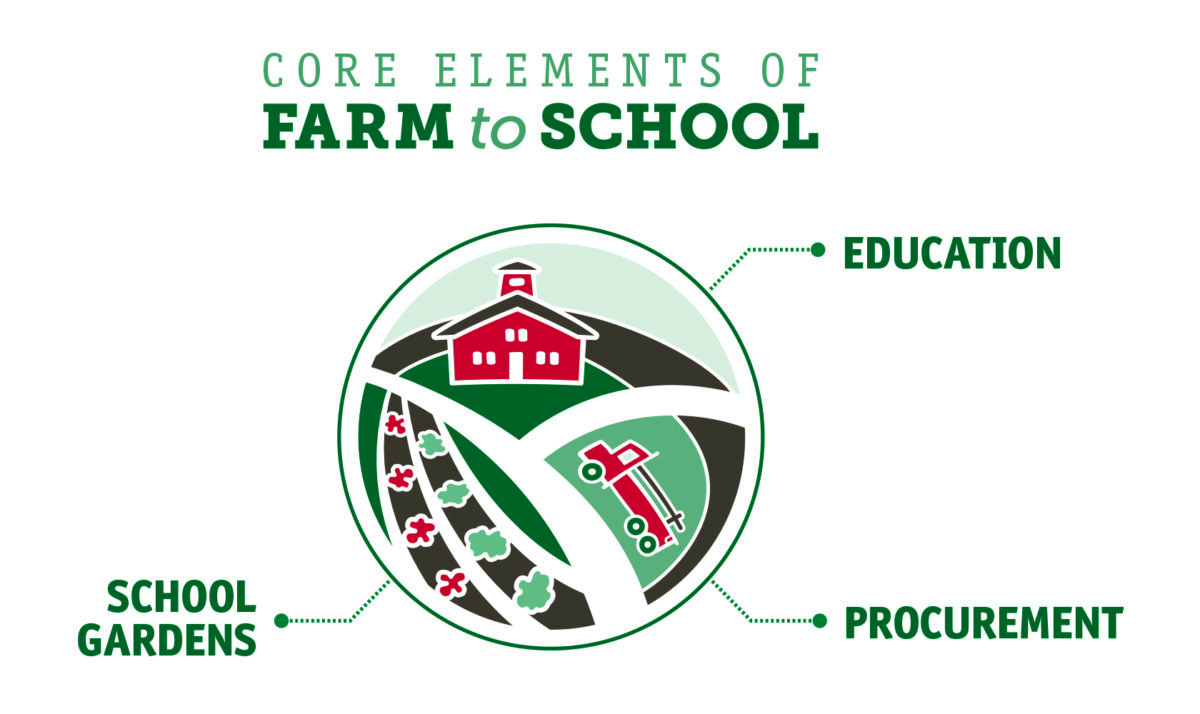Farm to Early Care and Education: Working to Equalize Health and Education Outcomes
Good nutrition and good educational outcomes for young children are inextricably linked. Yet, there is little consistency in terms of the quality of the food that is offered in early care settings. Given that approximately 60 percent of US children under the age of six spend time in some sort of childcare (or non-parental care) setting on a weekly basis, and typically eat breakfast and lunch (and possibly an afternoon snack) at these sites, ensuring the quality of the food is essential.
The Good Food, Great Kids policy overview and case studies, developed in partnership with the National Farm to School Network and the BUILD Initiative, is intended both to share a broad spectrum of existing information about various experiences in building farm-to-ECE supportive policies and to point out how forging greater connections between current policies and the work of farm to ECE can benefit early childcare centers, children, and families.
In this blog, Lacy Stephens, of The National Farm to School Network, sheds further light on this important topic.
 More than half of children under six from low-income families regularly participate in some kind of early care and education program, many of them getting 50-66% of their food in a child care environment. The low-income areas and communities of color in which many of these young children live also are often “food deserts” that lack access to affordable foods that make up the full range of a healthy diet. This makes it all the more important that the food provided in these early care and education settings be of the highest quality possible. The farm to early care and education (ECE) movement aims to ensure this happens by promoting connectivity between the ECE community and local community food systems with the intention of creating equitable health and education outcomes for all children.
More than half of children under six from low-income families regularly participate in some kind of early care and education program, many of them getting 50-66% of their food in a child care environment. The low-income areas and communities of color in which many of these young children live also are often “food deserts” that lack access to affordable foods that make up the full range of a healthy diet. This makes it all the more important that the food provided in these early care and education settings be of the highest quality possible. The farm to early care and education (ECE) movement aims to ensure this happens by promoting connectivity between the ECE community and local community food systems with the intention of creating equitable health and education outcomes for all children.
What is Farm to ECE?
Farm to ECE is a diverse set of activities and strategies that include the use of local foods in meals and snacks, gardening opportunities, and educational activities implemented to promote health and wellness and enhance the quality of the educational experience. Farm to ECE particularly addresses the need to influence eating behaviors and patterns and learning outcomes in the early years of life. Farm to ECE connects families, providers, and young children in all types of early care and education environments – Head Start, child care including family child care and out-of-school time, pre-K, and programs in K-12 settings — to healthy local foods and to meaningful educational opportunities focused on nutrition, food, and agriculture.
Core Elements of Farm to Early Care and Education
Farm to ECE varies by setting but usually consists of three core elements: 1) Gardening – an experiential educational opportunity for children to get their hands in the dirt and better understand how food grows; 2) Procurement – bringing local products into the ECE settings and building community relationships between ECE providers and local farmers; and 3) Education – ranging from sensory opportunities for the youngest children to learning about where food comes from and how it grows for the older ones as well as engaging families throughout the process.

A Few of the Many Benefits of Farm to ECE
- Experiential, hands-on education opportunities align with the natural learning style and curiosity of children, presenting not only the opportunity to meet their developmental needs but for programs to adhere to program performance (such as Head Start and CACFP) and early learning standards.
- Increased educational experiences, exposure to new foods, and a connection to healthy foods.
- An economic win for communities due to the dollars that consumers put back into the local economy.
- Bolstering of the local food system due to greater demand for healthy food (which creates increased access for all people).
- Increased access for parents to healthier food choices to provide at home as a result of farm to ECE activities.
- Promotion of equitable outcomes not only for children and families, but for small, local farms
Increasing Quality Through Federal and State Policy Efforts
Farm to ECE helps communities leverage policies and initiatives from the federal, state and community level to promote and support farm to ECE as a tool to improve the health and learning environment of these settings. For example, as programs aim to achieve new Head Start Program Performance Standards, farm to ECE opportunities, such as community connections to local food providers and utilizing educational activities to make meal times learning times, help providers meet those standards. Another way federal policy has helped increase quality is through Double Bucks, which double the value of SNAP benefits (formerly called Food Stamps) when people use them to buy local fruits and vegetables.
At the state level, many opportunities exist to connect systems with farm to ECE. States are succeeding in utilizing farm to ECE as an indicator of prioritization of health and wellness and, in some cases, using those farm to ECE initiatives as a means of gaining that additional quality rating in the Quality Rating Improvement Systems (QRIS). Wisconsin, for example, has been able to integrate gardening as an optional activity, which helps programs gain quality points within its QRIS. Pennsylvania is on that road as well. Its modified QRIS standards include a reference to farm to ECE activities, indicating that farm to ECE is being recognized as a way to increase quality, creating multiple benefits that resonate out into families and communities.
Not Resting on Our Laurels
We are thrilled that farm to ECE is being acknowledged in some states as a route to increased quality in ECE settings. We will continue to work to ensure that more states see this connection and that providers across the country increase access to farm to ECE opportunities. One of the first and most important steps in advancing farm to ECE and working towards the systemization of Farm to ECE in our state systems is to build and strengthen connections and networks at the local, state, and national levels. In addition to having national staff devoted to expanding the farm to school and ECE movements, the National Farm to School Network (NFSN) has Core Partners in every state who can provide resources and information on state and local level initiatives and resources. To find your Core Partner visit the NFSN Our Network page. You can also sign up for a free membership to the National Farm to School Network to stay up to date on all of the exciting advancements in farm to ECE across the country.
Click here for more information about farm to ECE opportunities.The National Farm to School Network (NFSN) is an information, advocacy and networking hub for communities working to bring local food sourcing and food and agriculture education into school systems and early care and education settings.
Explore More
Collaborative Leadership and Power Lessons on Authentic Family and Community Partnerships
Video June 20, 2024
During this one-hour webinar, hosted in partnership with Vital Village Networks, you’ll witness the limitless wisdom and leadership that lives in our communities. Hear about best practices and lessons learned from prenatal-to-three (PN3) coalitions across the country that are working to shift and share power with parents and community partners. We’ll explore what it looks like to build trust and relationships while redesigning what it means to lead together for the health and wellbeing of our children.

Family Engagement
Report June 13, 2024
Family engagement at the state and local level is an essential component of high-quality, inclusive early childhood care and education (ECCE) programs and systems. Engaging families as partners during the early years allows parents and caregivers to establish strong connections that support their children’s development, well-being, and achievement long term.
Ideas for Incorporating Strategic Financing Efforts into Your PDG B5 Application
Report June 13, 2024
This resource outlines ideas for incorporating strategic financing efforts into your PDG B-5 application.
